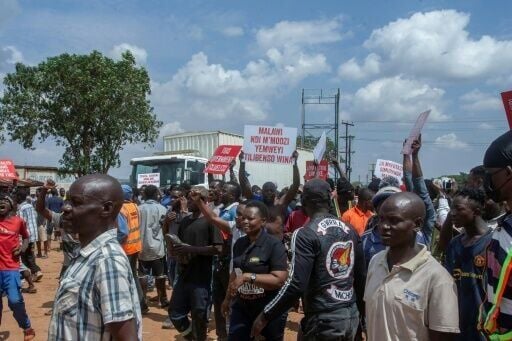
In a dimly lit bar tucked away in Mtandire, one of Lilongwe’s largest informal settlements, 32-year-old bartender Ben Manda wiped his tired eyes and poured yet another drink. He had been working nonstop for 36 hours, juggling back-to-back shifts to support his family of four.
“I haven’t been home in three days,” Manda said. “Times are tough.”
Manda’s exhaustion reflects a broader crisis gripping Malawi as the country battles deepening economic instability, worsened by foreign aid reductions, soaring debt levels, and the ripple effects of global and domestic shocks.
Above him, a flickering television broadcast reports of unpaid civil service salaries, budget deficits, and a cost-of-living crisis that has sent inflation soaring to 28.5% this year. Manda, like many Malawians, blames political mismanagement for the worsening situation.
“Our leaders divert the money from its intended use,” he said, referring to widespread accusations of aid misuse.
Malawi, a country of 21 million where over two-thirds live in extreme poverty according to the World Bank, has long relied heavily on foreign assistance. But this year, key donors including USAID, the UK, and others have scaled back their support, dealing a major blow to the economy.
The impact has been severe. “Since 2013, Malawi has lost an estimated five percent of its GDP annually—about $545 million—due to reduced donor assistance,” said Agness Nyirongo, an economic governance officer at the Centre for Social Concern.
Willy Kambwandira of the Centre for Social Accountability and Transparency warned that limited domestic revenues are now being funneled toward debt repayment at the cost of vital public services.
The International Monetary Fund (IMF) recently ranked Malawi among six countries with unsustainable debt levels. Between March 2020 and March 2024, public debt ballooned from 48% to 93% of GDP. The IMF cites emergency spending for the COVID-19 pandemic, the fallout from three cyclones, high inflation, and volatile exchange rates as key drivers of the debt surge.
Experts also point to structural weaknesses and overdependence on a single commodity: tobacco, which accounts for 60% of Malawi’s export earnings. Falling global prices have slashed foreign exchange inflows, exacerbating the country’s chronic trade deficits.
“The lack of export diversification continues to haunt Malawi’s economy,” said Bertha Chikadza, a university lecturer and president of the Economics Association of Malawi. “Debt servicing now consumes nearly half of all government revenue, leaving little room for critical sectors like health and education.”
Frustration has spilled onto the streets, with protests erupting in major cities over inflation, tax hikes, and deep cuts to public spending.
As the country prepares for general elections in September, President Lazarus Chakwera—seeking re-election—has intensified calls for global debt relief. Speaking at the UN General Assembly last year, he pleaded for what he called “breathing space” for Malawi and similarly burdened African nations.
Debt relief is a central issue for the G20 under South Africa’s presidency—marking the first time an African country has held the role. The South African government notes that over half of Africa’s 1.3 billion people live in nations that spend more on interest payments than on health, education, or infrastructure.
But writing off debt isn’t the answer, said David McNair, executive director for global policy at the One Campaign. “Developing countries like Malawi need access to more borrowing to invest in their future, especially given their growing populations,” he said.
The real issue, McNair argued, is that debt is simply too costly. He urged the G20 to address the role of ratings agencies and to explore mechanisms that could unlock affordable private financing for struggling nations.
As leaders debate long-term solutions, ordinary Malawians like Manda are left to shoulder the consequences. “We are just trying to survive,” he said quietly, before turning back to the bar.
